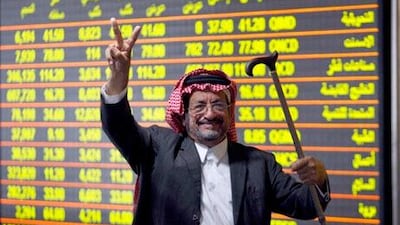The global financial crisis dented investor expectations worldwide except for one small Gulf nation where dreams of double-digit annual returns remain defiantly undiminished.
More Business news: Editor's pick of today's headlines
Last Updated: May 24, 2011
Torch buyers upset at changes A group of buyers in the world's tallest residential tower are in a dispute with the developer. Read article
Abu Dhabi aims to build new motorway The bidding process has begun for a second major expressway to link Abu Dhabi and Dubai. Read article
Industry Insights // Dubai's Swiss Cheese 0-14 building proves to be eco-friendly The 0-14 tower in Dubai's Business Bay was designed to stand out, but it's surprised its own architects by proving to be an energy-saving phenomenon. Read article
LinkedIn sparkles but may flatter to deceive LinkedIn debuted on the New York Stock exchange last week, but is it worth the share price? Read article
Qatari investors are dreaming of stock-market returns that are seemingly improbable, according to a survey.
The poll, conducted by the consultancy NMG Group and commissioned by Invesco Middle East, found that Qatari investors were expecting 21 per cent annual returns on their holdings and planned to hold on to investments for just over a year.
Overall in the region, the survey of more than 100 institutional and retail investors found GCC nationals expected to get 11 per cent returns annually and typically hold on to investments for just 2.2 years, providing ammunition for the oft-voiced contention that Gulf investors tend to be focused on local markets and favour speculation over long-term investment.
That contrasted starkly with the views of western expatriates in the GCC, who were expecting just 7 per cent returns over an average holding period of 6.7 years.
Historically, stock market returns in the developed world have averaged from 7 to 8 per cent a year.
The results underscored that asset managers had yet to convince local investors of the merits of long-term investing, said Nick Tolchard, the head of Invesco Middle East, the investment firm that commissioned the survey.
The findings also showed that the region's growing asset management industry had not yet attracted GCC nationals, who preferred to invest on their own and put their money primarily in tangible assets such as property, he said.
About 83 per cent of the people polled by NMG said GCC investors had short-time horizons, largely because of a lack of experience and cultural preferences. Sovereign wealth funds in the GCC were looking furthest ahead, the survey found, with an average 6.7 year time horizon, while expatriates came in at 5.1 years and GCC nationals 2.2 years. "The only other market where we see that sort of short-termism would be Hong Kong," said Mr Tolchard.
Akram Annous, a fund manager at Al Mal Capital in Dubai, said expectations of high returns in short time frames were an overhang from earlier bubbles in regional stock and property markets. Local investors, he said, had grown accustomed to doubling and tripling their money, making it hard to convince them to invest in safer but less profitable ways.
"The horizons are shorter because of the fact that markets were born so quickly and went into a frenzy so fast," he said. "You have a lot of people who are used to the punting mentality."
The current frenzy was most prominent with Qataris, who were expecting to make about double the returns Emiratis and Saudis were aiming for. Qatar's economy is the fastest-expanding in the world, with the IMF projecting 20 per cent growth there this year as new gas wells start to produce. It is also the world's wealthiest country on a per capita basis.
Nearly 90 per cent of those surveyed said they thought GCC investors had high exposure to tangible assets, largely because of cultural preferences. Local GCC investors had a 14.8 per cent average exposure to property, compared with 9.5 per cent for expatriates.
"GCC investors clearly prefer assets that are clear, understandable and easy to access," said Mr Tolchard.

